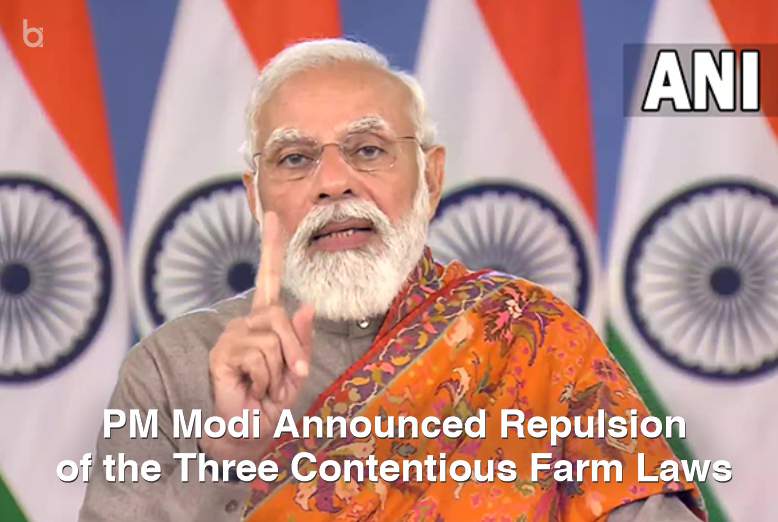In a piece of breaking news, PM Modi announced the repulsion of the controversial farm laws. After a year of agitation and repulsion over the farm laws, India’s PM Narendra Modi announced that the Centre will repeal the three contentious laws in the upcoming parliament sessions. On 19 Nov 2021, PM Modi announced the Central government will take steps to repeal the three farm laws while addressing the nation on the occasion of Guru Nanak Jayanti.
The Addressal Speech
While addressing the nation on the occasion of Guru Nanak Jayanti, PM Modi apologized and stated that the government has failed to convince a section of farmers over the benefits of the farm laws that were passed during September 2020. He also remarked that the three controversial laws will be repealed during November’s Parliament session.
In his addressal speech, PM Modi stated, “Whatever I did, I did for farmers. What I’m doing is for the country. With your blessings, I never left out anything in my hard work. Today I assure you that I’ll now work even harder, so that your dreams, and the nation’s dreams can be realised. We worked to provide farmers with seeds at reasonable rates and facilities like micro-irrigation, 22 crore soil health cards. Such factors have contributed to increased agricultural production. We strengthened Fasal Bima Yojana, brought more farmers under it. To ensure that farmers get the right amount for their hard work, many steps were taken. We strengthened the rural infrastructure market. We not only increased MSP but also set up record government procurement centres. Procurement by our government broke the record of past several decades.”
Farmers Vs The Centre (The Chronology)
Since 2020, farmers from all over the world have been protesting against the passing of the Farm Law that was passed in the Parliament in September 2020. Farmers from Punjab, Haryana, Uttar Pradesh and other states have been camping at Delhi’s borders since November 2020 in protest against the three legislations.
The protests have continued for over a year as deliberations between the government and farmers unions failed. After several rounds of talks between the government and farmer unions failed to end the protests, the Supreme Court stayed the implementation of three farm laws. Moreover, the protest also grabbed international attention as the international press had begun covering the widespread protests spread across the country. The raging protest also received massive support from international artists like Rihanna and environmental activist Greta Thunberg. Although the passing of the laws received huge support from several people across the country, the number of people protesting against the laws outnumbered the former.
In January 2021, the Supreme Court had stayed the implementation of these laws until further orders, for facilitating a negotiation process between the Centre and the protesting groups. The Supreme Court had also constituted a committee to hold the talks—that was boycotted by the leaders of the farmers union.
The Three Contentious Laws
The three farm laws that was passed in the Parliament in September 2020 were namely:
- Farmers’ Produce Trade and Commerce (Promotion and Facilitation) Act, 2020:
The Farmers’ Produce Trade and Commerce (Promotion and Facilitation) Act provides for setting up a mechanism allowing the farmers to sell their farm produces outside the Agriculture Produce Market Committees (APMCs). Any licence-holder trader can buy the produce from the farmers at mutually agreed prices. This trade of farm produces will be free of mandi tax imposed by the state governments.
- Essential Commodities (Amendment) Act, 2020:
The Essential Commodities (Amendment) Act is an amendment to the existing Essential Commodities Act. This law now frees items such as foodgrains, pulses, edible oils and onion for trade except in extraordinary (read crisis) situations.
- Farmers (Empowerment and Protection) Agreement on Price Assurance and Farm Services Act, 2020:
The Farmers (Empowerment and Protection) Agreement of Price Assurance and Farm Services Act allows farmers to do contract farming and market their produces freely.
The main grievance raised by the farmers is that the laws cause the dismantling of the state-run Agricultural Produce Marketing Committees, and will disrupt the Minimum Support Price mechanism. The protesting farmers raised their apprehensions that the laws will pave the way for corporate exploitation. Moreover, a batch of petitions has been filed in the Supreme Court challenging the validity of these farm laws and also questioning the competence of the Parliament in enacting the same.
Also Read: 5 Things To Consider About Business Startup Loans






















